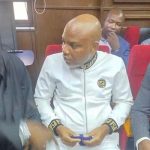Nigeria
BREAKING: Justice Nyako Adjourns Nnamdi Kanu’s Terrorism Trial Indefinitely

Justice Binta Nyako has indefinitely adjourned the trial of IPOB leader Nnamdi Kanu on terrorism charges, prolonging legal uncertainties surrounding the case.
Justice Binta Nyako of the Federal High Court in Abuja has indefinitely adjourned the trial of Nnamdi Kanu, the leader of the Indigenous People of Biafra (IPOB). The decision follows a recusal order issued by the judge, effectively halting proceedings in the case.
The legal battle, which has drawn national and international attention, faced a major roadblock on September 24, 2024, when Justice Nyako stepped down from presiding over the matter. Her decision came after Kanu expressed a lack of confidence in her ability to ensure a fair trial, formally requesting her withdrawal from the case.
The move to recuse herself was seen as a significant development, given her long-standing role in handling the case. Justice Nyako had overseen several stages of Kanu’s prosecution, including rulings on his bail applications and legal challenges against the charges brought by the Nigerian government.
Kanu, the self-proclaimed leader of IPOB, has been a controversial figure, advocating for the secession of the southeastern region of Nigeria to form an independent state called Biafra. His activism has led to multiple arrests and prolonged legal battles with the Nigerian authorities. His trial, which revolves around allegations of treason, terrorism, and inciting violence, has been closely watched by both his supporters and government officials.
The latest development in the case raises questions about its future. With Justice Nyako stepping aside, the judiciary will need to assign a new judge to the matter, a process that could take weeks or even months. The indefinite adjournment also means that Kanu’s legal team will likely explore further options, including appeals and diplomatic interventions.
Kanu’s supporters have repeatedly accused the Nigerian government of political persecution, arguing that the charges against him are an attempt to suppress his movement and silence his calls for self-determination. On the other hand, the government insists that his actions threaten national security and violate the country’s laws.
With the trial now in limbo, legal experts speculate on the possible next steps. Some believe the Nigerian judiciary may appoint a new judge to restart proceedings, while others argue that the government may explore alternative resolutions, including political negotiations.
As the case remains stalled, public reactions have been mixed. Pro-Biafra activists continue to demand Kanu’s release, while government loyalists insist that he must face justice. The adjournment has only intensified debates about Nigeria’s legal system and its handling of politically sensitive cases.
For now, Kanu remains in detention, awaiting further legal developments. His supporters remain hopeful that the judiciary will ultimately rule in his favor, while the government remains firm in its stance that the law must take its course.
